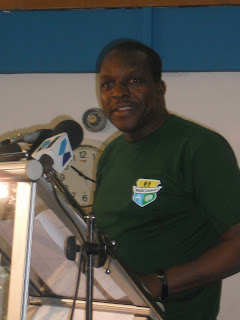Ghana Needs $200 Million Annually To Reverse Sanitation Downturn
EDMUND SMITH-ASANTE
The government of Ghana has indicated that it will need about $200 million annually over a long period, if it is to reverse the country’s poor sanitation coverage that it is experiencing currently.
According to the Joint Monitoring Programme (JMP) standards which are used as the yardstick for measuring global performance and progress towards achieving the MDGs, instead of Ghana achieving about 30% in sanitation coverage as at 2006 so that the country could be at 53% by 2015, only 10% had been achieved by then, which is an indication that if the rate of progress should remain as it is now, Ghana will achieve just about 15% by 2015.
Disclosing that Ghana would need such whooping amount annually to address its sanitation burden in Accra on Friday, as he launched a water, sanitation and hygiene initiative dubbed WASH-United, Minister of Water Resources, Works and Housing, Hon. Alban S. K. Bagbin lamented that “even though as a country we are well on our way to achieving the MDGs on water, the case for sanitation still leaves much to be desired.”
He stated that the sanitation sub sector had just covered 12.4% as at the end of 2008 “and requires around $200 million per annum in investment over time to reverse the situation.”
The Minister stressed that to be able to ensure the prevention of water borne diseases, reduction in mortality and morbidity rates, reduction in pre and post-natal risks for the citizenry among others, the Government of Ghana, through its various agencies, has adopted a sector-wide approach in the execution of policies, plans and programmes within the water and sanitation sector.
“The objective is to ensure the effective coordination and harmonisation of activities within the sector, in order to reduce cost and guarantee sustainability.
“As a policy, this approach is also meant to create sufficient space for civil society to participate meaningfully in the sustainable management of our water and sanitation resources and thus support government’s efforts to deliver improved services to the people,” he hinted.
He thereafter commended Wash-United, saying it had added an innovative dimension to government’s commitment of ensuring that every Ghanaian citizen has access to adequate water, sanitation and hygiene services.
Hon. Bagbin urged that the campaign, which aims at making public and personal hygiene a way of life, must necessarily involve sustained public education and also aim at changing attitudes and negative behaviours.
He reiterated the commitment of the Mills administration to work in close collaboration with development partners and civil society, by providing leadership and the necessary resources, for an accelerated delivery of basic water and sanitation services to the Ghanaian populace.
The Minister pledged that “the Ministry of Water Resources, Works and Housing, will continue to introduce various reforms and initiatives aimed at improving the performance of the Water and Sanitation sector for the achievement of national and MDG targets.”




Comments
Post a Comment